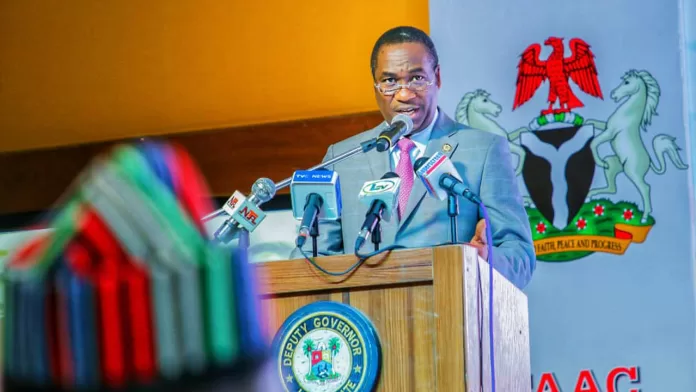Lagos State Deputy Governor, Dr. Obafemi Hamzat, has issued a stark warning regarding the dangers climate change poses to the state, emphasizing the need for immediate action to avert potential natural disasters.
His remarks came during a strategic stakeholders’ management meeting organized by the Ministry of Justice on Wednesday.
Dr. Hamzat highlighted alarming global examples, such as the United Kingdom and New York City, where residents are already relocating due to the adverse effects of climate change.
He cautioned, “If we do nothing, Lagos could face the same fate, with the threat of sinking and submersion looming.”
The deputy governor pointed out Lagos’s vulnerability, citing its extensive 180-kilometer shoreline.
“Today, both Lagos and New York City are sinking,” he stated, underlining the urgency of the situation. He identified extreme heat, climate change, and rising sea levels as three major threats facing the state.
Hamzat stressed the importance of re-evaluating priorities over the next two to 25 years, saying, “We must prioritise which areas to preserve.”
He criticized the mismanagement of land and inadequate physical planning in Nigeria, calling them some of the country’s biggest challenges. He noted, “In the UK, 14 percent of the land is managed by the City of London, with the remainder controlled by the national government.”
He also referenced New York City’s decision to halt the approval of new high-rise buildings due to concerns over the city’s sinking.
“We have to learn from these global examples and act now before it’s too late,” he urged stakeholders, calling for proactive measures to address these existential threats.
The Attorney General and Commissioner for Justice, Mr. Lawal Pedro (SAN), also addressed the gathering, noting that the stakeholders’ meeting aimed to reduce government litigations in courts and prevent further clogging of the justice delivery system with avoidable cases.
READ ALSO: Why Lagos State Did Not Join Lawsuit against EFCC – Lagos AG
He reported that as of July 2024, there were over 6,047 pending cases in court, with land disputes alone accounting for more than 2,500 cases.
Pedro stated, “The government’s financial exposure in these cases amounts to approximately N114.5 billion.” He emphasized that the meeting brought together key players in the justice sector to foster a collaborative approach for efficient justice delivery in Lagos State.
“This meeting is a product of the insightful discussions we had during the Lagos Justice Summit earlier this year,” he said, highlighting the recommendations for greater synergy, transparency, and cooperation among all stakeholders.
He reiterated that justice delivery requires combined efforts from various institutions, stating, “Lagos State remains committed to the rule of law, accountability, and good governance.”
Pedro also discussed the importance of improving coordination between law enforcement agencies and the Ministry of Justice, particularly in prosecuting state offences.
“We are developing a process to enhance this coordination, especially where security agencies are deemed to have the Attorney General’s general fiat,” he explained.
Reassuring security agencies of the ministry’s support in combating corruption, he also emphasized the Attorney General’s duty to protect citizens from oppression through the misuse of the court system.
“The court process must not be used to harass or intimidate citizens into settling civil disputes or personal scores,” he warned.
To prevent the justice system from becoming congested with avoidable cases, Pedro urged the ministry and various Ministries, Departments, and Agencies (MDAs) to reduce litigation, close inter-ministerial gaps, and minimize government exposure to liabilities.
He proposed redesigning operational systems to enhance performance, reduce costs, and improve service delivery. “Redesigning our processes will benefit both MDAs and the public by reducing unproductive activities, improving flexibility, and accelerating access to information,” he concluded.


